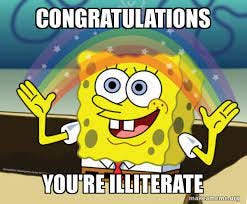# The Hidden Dangers of AI: Illiteracy and Misinformation
Written on
Chapter 1: The Illiteracy Crisis
In 2022, it was reported that 21% of adults in the United States struggle with illiteracy, while 54% possess reading skills below a sixth-grade level. This alarming statistic highlights a growing challenge in a nation that often appears incapable of rational discourse, even among those deemed intelligent. As AI-generated content increasingly permeates the internet, I can’t help but feel apprehensive about the consequences that will ensue.
Even with discussions around implementing markers to help users identify AI-created content, I doubt this will significantly alter the situation. The ability to distinguish between wild conspiracy theories and verified facts has almost disappeared. Given the current literacy levels in the U.S., it seems unlikely that the public will effectively differentiate between material generated by AI and that created by humans.
This reality is genuinely frightening. The implications are vast, affecting everything from everyday conversations to political leadership. We risk deepening societal divides and further eroding the cooperation that society desperately needs.
While some may attribute the decline in reading skills to the pandemic, this issue predates it and can largely be traced back to our increasing reliance on the internet. An article points out, “There is concern that the reliance upon shallow reading may interfere with the development of deep reading skills such as thoughtful pondering, critical analysis, and inferential thinking. It is feared that neurological connections required for deep reading such as brain areas involved in visual processing and phonological processing may not be made in those people who learn primarily via shallow reading” (Loh 2015).
The widespread denial of scientific fact and the acceptance of misinformation that flourished during the early days of the COVID-19 pandemic have only grown since then. If both the educated and uneducated are unable to respond rationally as AI continues to saturate the information landscape, what hope do we have?
I firmly believe that AI-produced “news,” “science,” and “truth” will have an irreversible impact on our future. Even more unsettling is the likelihood that few will notice this transformation. AI will seamlessly integrate into society, accepted by all but the most discerning individuals, who will be dismissed and marginalized.
Culturally, socially, and environmentally illiterate individuals will cling to any evidence that supports their misguided beliefs, and there will be no shortage of such evidence. Unsurprisingly, those who stand to gain from the spread of propaganda and misinformation will eagerly adopt this technology, using it as a tool to dismantle the remnants of civil society.
“One characteristic of those who live in a Technopoly is that they are largely unaware of both the origins and the effects of their technologies.” — Neil Postman, Technopoly: The Surrender of Culture to Technology
Section 1.1: The Role of AI in Misinformation
As AI technology advances, it becomes increasingly capable of generating content that appears credible. This raises serious questions about the integrity of information available to the public.

Subsection 1.1.1: Understanding AI-Generated Content
The first video, "SCARIEST Things Done By AI So Far Will Give You A NIGHTMARE!!", explores the unsettling capabilities of AI and the potential consequences of its unchecked growth. It serves as a wake-up call regarding the dangers posed by AI-generated information.
Section 1.2: The Consequences of Illiteracy
The societal effects of widespread illiteracy are profound, influencing everything from personal relationships to political landscapes.
In the second video, "6 Scariest Things Said by A.I. Robots [REACTION!!!]", viewers react to some of the most alarming statements made by AI, underscoring the urgency of addressing these challenges.
Chapter 2: The Path Forward
As we navigate these complexities, it is essential to confront the intertwined issues of literacy and technology.